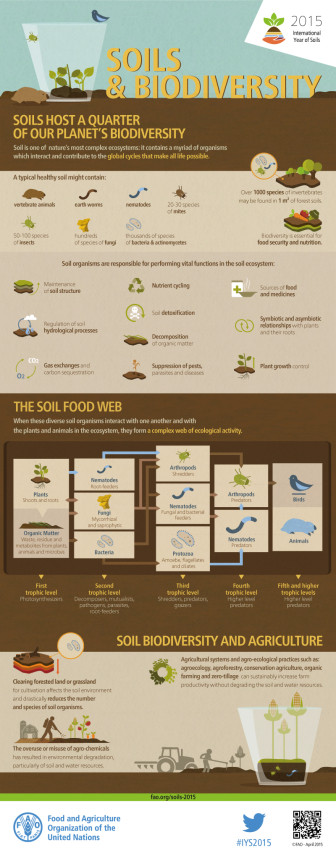FOR IMMEDIATE RELEASE
October 16, 2015
Contact:
English: Katherine Paul, 207.653-3090, Katherine@regenerationinternational.org
English: Lauren Stansbury, 402.540.1208, lauren@wearemovementmedia.com
Spanish: Ercilia Sahores, +52 (55) 6257 7901, ercilia@regenerationinternational.org
Organic Regenerative Agriculture Can Ease World Hunger and Reverse Global Warming
On World Food Day, International Experts Say Fossil Fuel Reduction Isn’t Enough; Survival Requires that We Also Restore the Capacity of the World’s Soils to Sequester Carbon and to Feed Vulnerable Populations
WASHINGTON D.C. — The nonprofit organization Regeneration International will hold a press conference today at 9 a.m. at the National Press Club, titled “The Future of Food: From Degeneration to Regeneration.” A panel of 10 international experts on organic agriculture, carbon sequestration and world hunger will speak to the capacity of organic regenerative agriculture to draw excess carbon from the atmosphere and sequester it in soil; how regenerative agriculture provides livelihoods for farmers, revitalizes local economies, and produces abundant food for populations most vulnerable to the consequences of climate change. For more information about World Food Day, Regeneration International and this press conference, please visit: https://regenerationinternational.org/world-food-day/.
Speakers will include:
- Vandana Shiva, author, activist and founder of Navdanya;
- Ronnie Cummins, international director, the Organic Consumers Association;
- Tom Newmark, co-founder, The Carbon Underground;
- Andre Leu, president, IFOAM Organics International;
- Christophe Malvezin, Agricultural Counselor, French Embassy in the U.S.;
- Ashley Koff, nutrition expert & creator of Better Nutrition Simplified;
- Precious Phiri, Africa Center for Holistic Management;
- Will Allen, author, activist and founder of Cedar Circle Farm;
- Debbie Barker, international programs director, Center for Food Safety;
- Jessica Shade, director of science programs at The Organic Center.
A live stream of the conference will be available here: https://regenerationinternational.org/world-food-day-livestream.
“On this World Food Day let us make a collective commitment to make a transition from an industrial agriculture model which has killed 300,000 Indian farmers, contributed 40 percent of GHGs leading to climate change, and created hunger, poverty and disease, to a regenerative agriculture that grows more and healthier food, rejuvenates the soil while reversing climate change, and sows the seeds of democracy and peace,“ said Vandana Shiva.
Ronnie Cummins said: “Regenerative organic food, farming and land use, scaled up globally on billions of acres of farmland, grassland and forests, can feed the world and reverse global warming and deteriorating public health. An international alliance of small farmers, ranchers and indigenous communities, allied with conscious consumers, can literally cool the planet, restore soil health and biodiversity, and move us away from climate catastrophe and societal degeneration.”
André Leu said: “We have good peer-reviewed science showing the scaling up of regenerative organic agriculture can reverse climate change, end the loss of biodiversity, stop the poisoning of our children and planet and very importantly, nourish all people with high quality food.”
Tom Newmark said: “On this World Food Day we face two interlinked planetary challenges: to produce enough food for all people and to sequester enough carbon in the soil to reverse climate change. There is one solution for those challenges: regenerative organic agriculture. We can no longer afford to rely on chemical farming, as the use of synthetic fertilizers, herbicides and pesticides has destroyed soils worldwide and rendered them unable to rebuild soil organic matter. It is now time for people and all governments to embrace the regenerative solution.”
Precious Phiri said: “Around the world, soil is the common currency and the only hope we have to rebuild our local economies, restore dignity and social structures while reversing climate change. We cannot achieve these benefits from the soil using harmful chemicals and heavy machinery. We must promote regenerative organic agriculture, in all communities and cultures around the world.”
Ashley Koff said: “This World Food Day, ask not what your food can do for you, but what our food will do for us all in the decades to come. The answer to whether our food feeds us all for better health lies in the health of our soil, not biotechnologies. Simply, if our soil contains the nutrients our bodies need for better health, so too can our food. Investing in our soil is the best health investment we must all make.”
###
Regeneration International is a 501(c)(3) nonprofit dedicated to building a global network of farmers, scientists, businesses, activists, educators, journalists, governments and consumers who will promote and put into practice regenerative agriculture and land-use practices that: provide abundant, nutritious food; revive local economies; rebuild soil fertility and biodiversity; and restore climate stability by returning carbon to the soil, through the natural process of photosynthesis.


